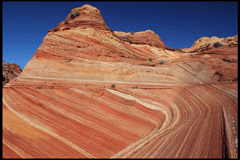End of an Epoch
Air Date: Week of July 18, 2008

(Photo: Rick Zhuang)
Most geologists now agree that the Holocene epoch is over. In its place scientists suggest we have entered the Anthropocene, an epoch named for the human induced changes to geology. Dr. Jan Zalasiewicz is chairman of the United Kingdom Stratigrapher Commission. He explains the name change to host Bruce Gellerman.
Transcript
GELLERMAN: In case you hadn’t noticed, we’re living in a whole new Epoch. Goodbye Holocene, Hello Anthropocene. For the last 10,000 years or so we’ve been blessed with an unusually mild and consistent climate but stratigraphers - the experts who decide this stuff - say we’re now in a whole new scene brought on by us. The International Commission on Stratigraphy will soon be meeting in Norway to make the epoch changing name official. Jan Zalasiewicz is chairman of the United Kingdom Stratigraphy Commission based in Leicester, England.
ZALASIEWICZ: Well if we look at the changes that are taking place now and have taken place over the last couple of centuries in terms of changes to atmospheric composition, soils and sediments, changes to the biology of the Earth. We consider that as comparable to some of the great changes of the geological past. Hence we propose that formally we’re no longer in the Holocene; that we’re in the Anthropocene.
GELLERMAN: Well when did that happen?
ZALASIEWICZ: Well the great change from if like a time when humans were around and having an impact but not a global impact to humans really changing the surface of the Earth probably started about the Industrial Revolution so that would be about the year about 1800 or so when the human population went over a billion and also, crucially, humans started using coal, oil, gas to hugely amplify the energy they could exploit.
GELLERMAN: The idea is that civilization, human civilization, has changed geology.
ZALASIEWICZ: That’s right, yes, yea, because if you were to look at the changes we’re making, for instance, the changes to the Earth’s biology, great changes on land and changes in the sea as well, with many species becoming extinct, many others being translocated to different parts of the globe, that will translate into the future fossil record, and probably already we’re making quite a distinctive signal that will be detectable for many millions of years afterwards.

Jan Zalasiewicza
ZALASIEWICZ: Yes, almost certainly, in fact undoubtedly. We’ve already made a number of species extinct. And I think one, entirely novel effect, is the way that we’ve transplanted many species of animals and plants from one continent to another, from one ocean to another, and the effect of that is still unpredictable but it will be large and will translate into geology.
GELLERMAN: So stratigraphers in the distant future, your colleagues, will be digging through the record, and they’ll come across: Anthropocene.
ZALASIEWICZ: They will almost certainly see a change in the rocks of the future. So the change might include let’s say an extinction event, much like the extinction event that we can see that took place around 65 million years ago when the dinosaurs and many other creatures died out. They may well see evidence changes in sea level, they may see evidence of changes in the chemistry of the oceans, for instance the oceans becoming more acid and hence literally dissolving parts of the sea floor where you’ve got deposits of lime, of calcium carbonate at the moment.
GELLERMAN: Plus all the artifacts of our generation – all the plastic, the concrete, the steel, the cars, all the junk.
ZALASIEWICZ: That’s right, yes. A city is for us something we live in, but it’s also a very material object which in effect will form a future stratum you know all of that concrete, and brick, glass and tarmac, asphalt—that is potentially preservable and that will make a very distinct rock type.
GELLERMAN: So if we were going through the geological record say 15,000 years in the future would you find a bright big demarcation in that record, you’d know when you hit the Anthropocene?
ZALASIEWICZ: Yes I think if you had looked even 15 million years in the future then the changes that we’re causing right now are geologically abrupt, almost instantaneous, in fact 15 million years in the future the changes that are happening right now will look almost akin to that of the meteorite strike which it is thought killed off the dinosaurs at the end of the crustaceous period. You know it is we’re looking at that level of rapidity.
GELLERMAN: So Dr. Zalasiewicz how consequential are humans in terms of you know, the natural cycles of the Earth? I mean gravity and erosion are the forces that are really shaping the planet, right?
ZALASIEWICZ: They are. In terms of lets say landscape formation, erosion, denudation, and so forth then yes gravity, water, wind, waves, and so on. There have been a few recent studies, including some published by the Geological Society of America, which have suggested that humans have now taken over the top stop as regards eroding the surface of the Earth, as regards transporting masses of soil and rock and sediment around the surfaces of the Earth.
Again its another of the symptoms of the Anthropocene and that is both the sediment transported as we build things, as we build our cities, and roads, and bridges, and so forth and also sediment transported as we convert a large part of the landscape into feedstock and agriculture moves a lot of sediment around simply as a byproduct of farming.
GELLERMAN: We’re also at the edge of going to other planets and changing their geology.
ZALASIEWICZ: That’s right, yeah.
GELLERMAN: So it could be not just Earth-bound geology that you’re gonna be dealing with in the future but planetary, the Age of Planetarium?

If geologists are still around millions of years in the future, they will be able to see a clear line of strata that indicates the Anthropocene, showing sea level rise, translocation of species, and increased carbon dioxide. (Photo: Rick Zhuang)
ZALASIEWICZ: Well that’s right there’ve been ideas which are partly in the realm of science fiction of going let’s say to Mars and if you like Terra-forming it, trying to alter conditions of the atmosphere and such like you know to make it more habitable. Whether that is realistic or not it’s hard to say but those ideas have been floated as they have for Venus. It’s interesting also that in this context the word terra-forming has been applied to colleagues of mine with respect to Earth. That humans are in effect now terra-forming the Earth.
GELLERMAN: Boy this is exciting stuff.
ZALASIEWICZ: It is. We live in a remarkable time geologically and what’s really exciting is that just at the moment as humanity is got the power to change the planet it’s also got the ability to reflect on the changes that it’s causing to Earth.
GELLERMAN: Well I want to thank you very much. I really appreciate your time.
ZALASIEWICZ: Thank you very much indeed.
GELLERMAN: Jan Zalasiewicz is chairman of the United Kingdom Stratigraphy Commission.
[MUSIC: Bajofondo “Grand Guignol” from ‘Mardulce’ (Decca Records—2008)]
GELLERMAN: Coming up: who turned off the lights? We go hunting for fireflies. Stay tuned to Living on Earth!
ANNOUNCER: Support for the environmental health desk at Living on Earth comes from the Cedar Tree Foundation. Support also comes from the Richard and Rhoda Goldman Fund for coverage of population and the environment. And from Gilman Ordway for coverage of conservation and environmental change. This is Living on Earth on PRI—Public Radio International.
Links
Living on Earth wants to hear from you!
Living on Earth
62 Calef Highway, Suite 212
Lee, NH 03861
Telephone: 617-287-4121
E-mail: comments@loe.org
Newsletter [Click here]
Donate to Living on Earth!
Living on Earth is an independent media program and relies entirely on contributions from listeners and institutions supporting public service. Please donate now to preserve an independent environmental voice.
NewsletterLiving on Earth offers a weekly delivery of the show's rundown to your mailbox. Sign up for our newsletter today!
 Sailors For The Sea: Be the change you want to sea.
Sailors For The Sea: Be the change you want to sea.
 The Grantham Foundation for the Protection of the Environment: Committed to protecting and improving the health of the global environment.
The Grantham Foundation for the Protection of the Environment: Committed to protecting and improving the health of the global environment.
 Contribute to Living on Earth and receive, as our gift to you, an archival print of one of Mark Seth Lender's extraordinary wildlife photographs. Follow the link to see Mark's current collection of photographs.
Contribute to Living on Earth and receive, as our gift to you, an archival print of one of Mark Seth Lender's extraordinary wildlife photographs. Follow the link to see Mark's current collection of photographs.
 Buy a signed copy of Mark Seth Lender's book Smeagull the Seagull & support Living on Earth
Buy a signed copy of Mark Seth Lender's book Smeagull the Seagull & support Living on Earth

